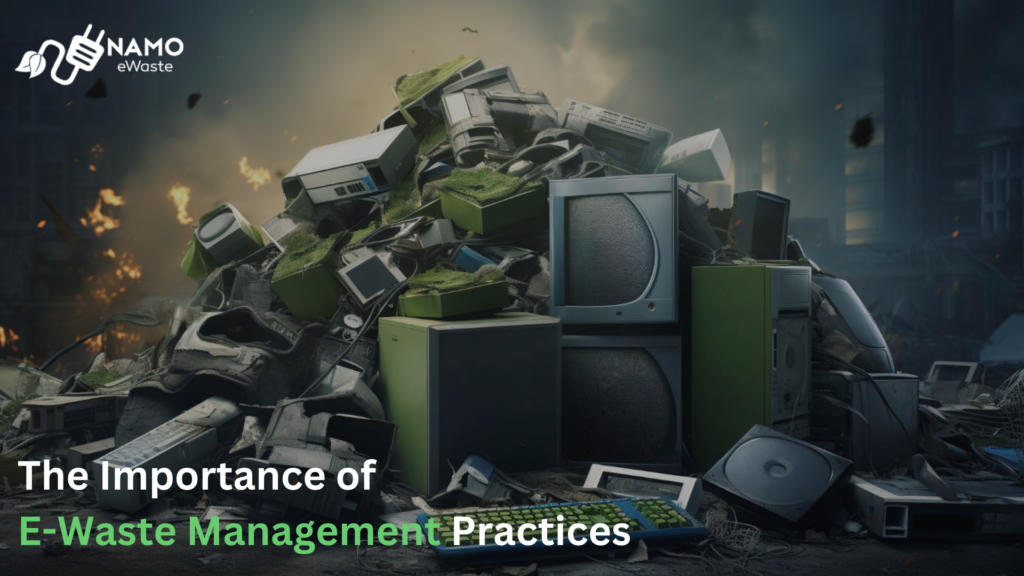Electronic gadgets are becoming a necessary part of our everyday life in the digital age, acting as instruments for productivity, amusement, and communication. But a worrying tendency has emerged as a result of technology’s quick advancement: an enormous rise in electronic garbage, or “e-waste.” Our constant quest for the newest technology, from computers and cellphones to TVs and refrigerators, has created a serious environmental problem that needs immediate solutions.
Challenges in E-Waste Management
To reduce the threats that electronic waste poses to the environment and human health, effective e-waste treatment is essential. Still, many obstacles stand in the way of this field’s advancement. The ignorance of customers about the correct recycling and disposal of electronic gadgets is one of the main challenges. Many people throw away their outdated electronics in typical household trash without thinking about the possible environmental damage. The problem is further complicated by a lack of infrastructure for the collection, recycling, and disposal of e-waste. Unsafe procedures used in informal recycling operations in some locations worsen pollution to the environment and put workers’ health at risk.
Why is E-Waste Management Important?
The significance of best e-waste management practices cannot be overstated. As the consumption of electronics continues to rise, so does the volume of e-waste generated. Proper e-waste management offers several benefits:
- Energy Conservation: Recycling electrical waste lessens the need to mine natural resources for raw materials.
- Environmental Protection: Preventing soil and water contamination by keeping e-waste out of landfills contributes to a cleaner, greener world.
- Minimization of Greenhouse Gas Emissions: Recycling electronic waste reduces greenhouse gas emissions from raw material extraction and production.
- Resource Recovery: By recycling, valuable metals like gold, silver, and platinum that are present in electronic recyclables can be recovered.
E-Waste Management Rules in India
E-waste management in India is predominantly informal, with a large portion of collection and recycling handled by the informal sector. However, efforts are underway to streamline e-waste management practices through legislative measures.
In November 2022, the Ministry of Environment and Forests notified the E-Waste (Management) Rules, 2022, aimed at digitizing the e-waste management process and enhancing transparency. Key provisions of the rules include:
- Extended Producer Responsibility (EPR): Manufacturers are responsible for managing the disposal and recycling of electronic products once they reach the end of their lifecycle.
- Collection Targets: Companies must collect a certain percentage of the electronic products they sell each year for recycling or proper disposal.
- E-Waste Exchange: An online platform facilitates the exchange, return, and recycling of e-waste among producers, consumers, and recyclers.
- Deposit Scheme: A deposit refund system encourages consumers to return electronic products for recycling by offering refunds upon return.
- Guidelines for Recyclers: Safe and efficient processing of e-waste is ensured through guidelines for recyclers.
- Penalties for Violations: Non-compliance with the rules may result in fines or other legal actions.
Namo eWaste is dedicated to solving the problem of e-waste management by offering complete solutions catered to the requirements of both people and companies. Namo eWaste guarantees responsible handling of electronic trash with minimal environmental impact, thanks to its modern facilities and committed staff. By working together with Namo eWaste, you can efficiently recycle your e-waste and contribute to a sustainable future.
To sum up, adopting the best e-waste management techniques is crucial to attaining sustainable living and safeguarding the environment for coming generations. By raising awareness, working together, and taking responsible action, we can manage e-waste and make the world a cleaner, greener place. Today, let’s begin our journey toward a sustainable lifestyle.


